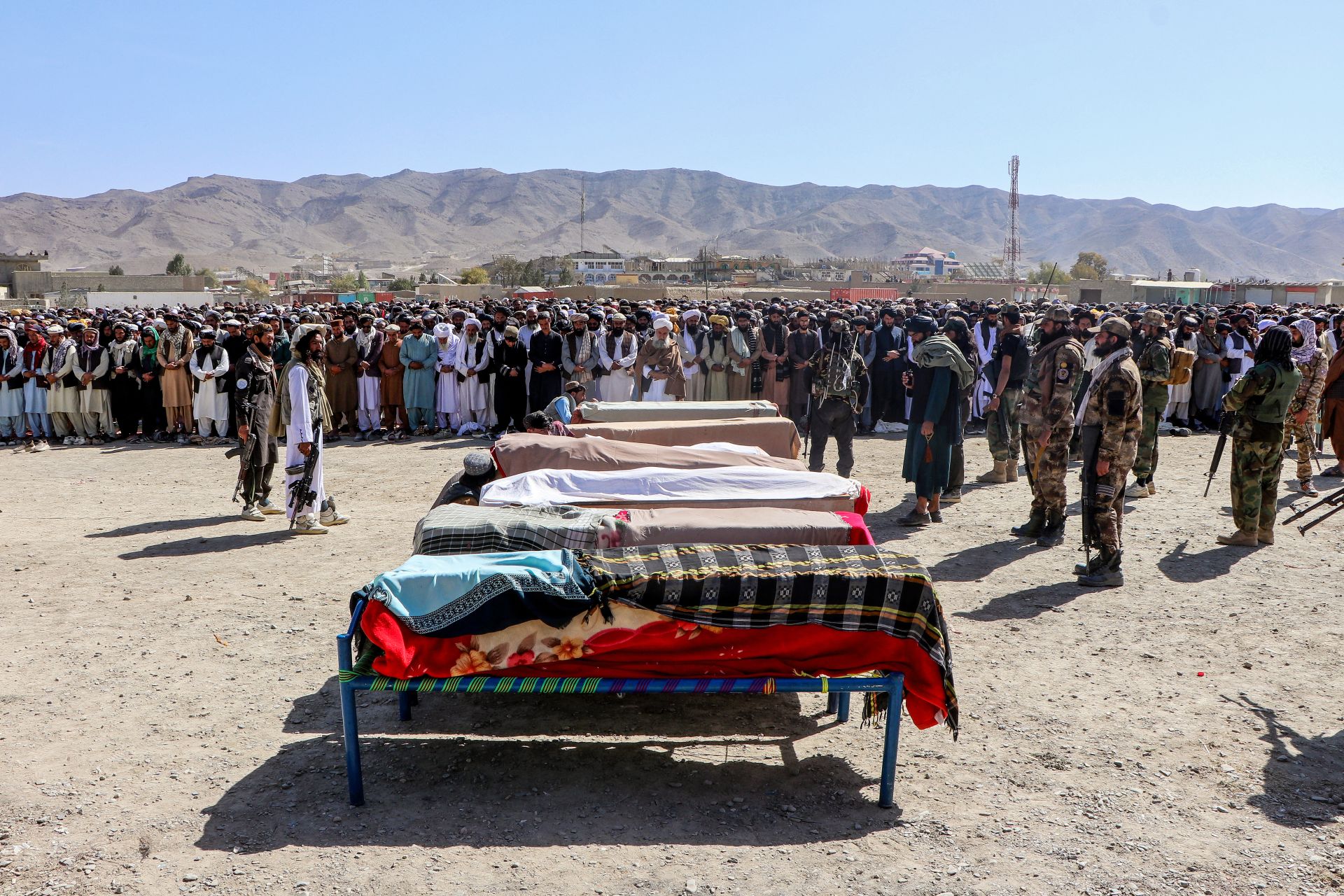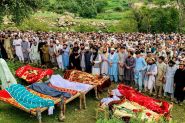- Home
- Middle East
- Pakistan to Hold Talks with Afghanistan in Qatar after Latest Strikes

Afghan relatives and mourners offer prayers during the funeral ceremony of victims, killed in aerial strikes by Pakistan, at the Urgun district of Paktika province on October 18, 2025. ©AFP
Pakistani and Afghan officials were due to meet in Qatar on Saturday, a day after Islamabad launched air strikes that killed at least 10 people in Afghanistan and broke a ceasefire that had brought two days of calm to the border.
The strikes targeted what Pakistani security sources said was a militant group linked to the Pakistani Taliban in the Afghan border areas, following an attack that killed Pakistani paramilitary troops in North Waziristan, a district in Pakistan's northwest.
Kabul accused Islamabad late on Friday of violating the truce, which had briefly paused nearly a week of cross-border clashes that killed dozens of troops and civilians on both sides.
"The talks will focus on immediate measures to end cross-border terrorism against Pakistan emanating from Afghanistan and restore peace and stability along the Pak-Afghan border," Pakistan's foreign ministry said in a statement.
Pakistan's defense minister Khawaja Asif and intelligence chief General Asim Malik were part of the Doha delegation, state TV reported.
The Afghan Taliban's defense ministry confirmed on social media platform X that a delegation led by Defense Minister Mohammad Yaqoob had reached the Qatari capital.
A senior Taliban official told AFP that "Pakistan has broken the ceasefire and bombed three locations in Paktika," a province in Afghanistan's east, warning that "Afghanistan will retaliate."
However, Afghan Taliban spokesman Zabihullah Mujahid said on Saturday that, while Kabul held the "right to respond to these violations," its forces had been ordered to refrain from undertaking new military operations "in order to maintain the dignity and integrity of its negotiating team."
A provincial hospital official told AFP on condition of anonymity that 10 civilians, including two children, were killed and 12 others wounded in the latest strikes.
The Afghanistan Cricket Board told AFP three players participating in a domestic tournament in the region were among the dead, revising down an earlier toll of eight.
It also announced its withdrawal from next month's Tri-Nation T20I Series involving Pakistan.
A senior Pakistani security official told AFP that its forces had carried out "precision aerial strikes" targeting the Hafiz Gul Bahadur Group, a faction linked to the Tehreek-e-Taliban Pakistan (TTP), which Islamabad blames for Friday's North Waziristan attack.
'Still Afraid'
Security issues are at the heart of the tensions, with Pakistan accusing Afghanistan of sheltering militant groups led by the TTP, a claim Kabul denies.
"Equally disconcerting is the use of Afghan soil for terrorism in Pakistan," Pakistan's army chief, General Asim Munir, said at a military parade on Saturday.
Munir said that "proxies have sanctuaries in Afghanistan" and were "using Afghan soil to perpetrate heinous attacks inside Pakistan."
Defense Minister Asif went further, accusing Kabul of acting as "a proxy of India" and "plotting" against Pakistan.
In response, Afghan Deputy Interior Minister Mullah Mohammad Nabi Omari said, "We neither brought the TTP here nor supported them, nor did they come during our time."
The cross-border violence flared on October 11, days after explosions rocked Kabul during an unprecedented visit by the Taliban's foreign minister to India, Pakistan's regional rival.
The Taliban then launched a deadly offensive along parts of its southern border with Pakistan, prompting Islamabad to vow a strong response.
Islamabad said the truce was to last 48 hours after it began on Wednesday, but Kabul said the ceasefire would remain in effect until Pakistan violated it.
Mujahid, the Taliban government spokesman, said its forces had been ordered not to attack unless Pakistan violated it.
Saadullah Torjan, a minister in Spin Boldak in Afghanistan's south, said, "For now, the situation is returning to normal."
"But there is still a state of war, and people are afraid."
AFP
Read more



Comments